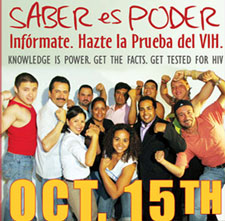
LOS ANGELES (FinalCall.com) – A recent study found that primary health care providers in predominantly Latino communities offer little counseling, safe-sex advice and HIV testing for their patients.
In its introduction, the University of California Los Angeles (UCLA) AIDS Institute’s probe indicated that sexually transmitted infections (STIs), such as human immunodeficiency virus (HIV), are increasing among the U.S. Latino population, particularly in states like California, which boasts one-third of the Hispanic population.
The Centers for Disease Control (CDC) reports that current numbers of HIV and AIDS cases among Latinos are not increasing as quickly as the population figures reported by the Census, however, the impact of HIV and AIDS in Latino communities is disproportionate when compared to other racial and ethnic groups.
“In 2000, Latinos represented 13 percent of the U.S. population (including residents of Puerto Rico), but accounted for 19 percent of the total number of new AIDS cases reported among adults and adolescents (8,140 of 41,960 cases). The annual reported AIDS rate per 100,000 population (the number of new cases of a disease reported during a specific time period) among Latinos in 2000 was 30.4. This was almost four times the rate for Whites (7.9), but lower than the rate for African Americans (74.2),” the CDC indicated.
“The STI and HIV Testing Practices of Primary Care Providers” was published in this month’s Journal of the National Medical Association. It anonymously surveyed primary care providers (PCPs) who practiced in mostly Latino communities in L.A. County between March and June 2004. It used providers listed in the California Medical Board Directory, California Latino Medical Association Directory and the Hispanic Independent Physician Association Directory for Los Angeles County.
According to the document, 41 percent of the PCPs had regularly offered advice about STIs or safe sex to patients during the prior six months, however, only 36 percent had offered more than 20 HIV tests during the same period.
It cited language problems and a patient’s young age, as well a patient’s sexual orientation, among the most common barriers to STI counseling. The most common barrier to taking patients’ sexual history included the mother, relative or partner being present at the time of patient visit.
“PCPs who predominantly care for Hispanic patients may be in need of interventions to increase their safe-sex advice and offering of HIV testing to their patients,” stated the study’s authors, Dr. Mitchell Kushner and Dr. Rosa Solorio.
Daniel Leyva, Project Coordinator for the New York-based Latino Commission on AIDS, stated that even though there have been more than 20 years of the epidemic and just as many years of advancements in HIV testing, society is still lacking mechanisms to distribute information in culturally appropriate language.
“I think that still in the Latino community, as in many other communities, there is a belief that HIV is tied up with certain populations and we know that’s not the case. HIV is tied to behavior–unprotected sex, exchange of used needles, and peri-natal transmissions–not populations,” he said.
Mr. Leyva opined that there is adequate testing availability in many states, but the problem does not start with testing. “If someone tests positive in a state which doesn’t provide resources, what does the person do? In the back of the mind of someone potentially living with HIV, the question becomes, how am I going to take care of this new condition, aside from the stigma attached to the idea of being HIV positive; therefore, a lot of people decide not to know,” he added.
As for healthcare’s role, the AIDS activist continued that infected persons confront a host of medical issues, including disclosing their condition and dealing with mental health factors in places with no infrastructure to meet their needs.
Christine Maggiore, a wife, mother, author and activist, who tested HIV positive in 1992, told The Final Call that she has deep concerns that the tests do not test for the virus itself, nor for any markers that are specific and unique to HIV.
“I’m not advocating people don’t test. I’m advocating that we all have the opportunity to understand that not even the FDA says that these tests can be used for the specific, intended purpose of diagnosing infection with HIV,” Mrs. Maggiore stated.
Her personal quest for knowledge and information led her to pen “What If Everything You Thought You Knew About AIDS Was Wrong.” “My concerns are further exacerbated by the fact that there is no HIV test anywhere on the market available at any laboratory that has ever been validated by the direct isolation of HIV from a human being who tested positive on antibody viral load or other so called HIV test. So all our ideas about accuracy are based on assumptions rather than validation, which is deeply troubling with a test that has the power to say you shall live. You shall die,” Mrs. Maggiore asserted.












